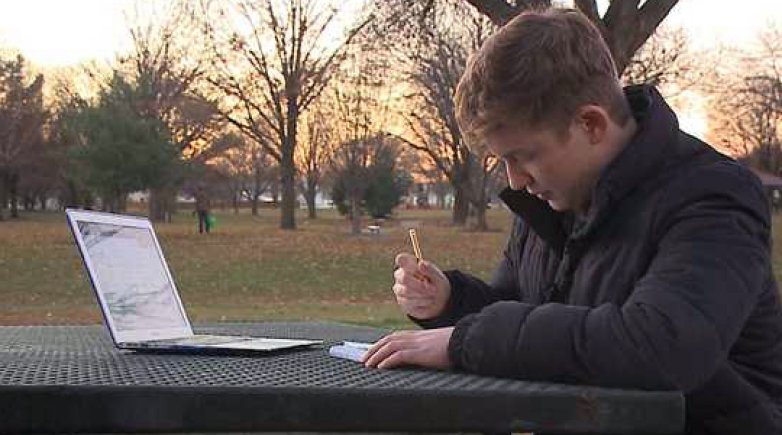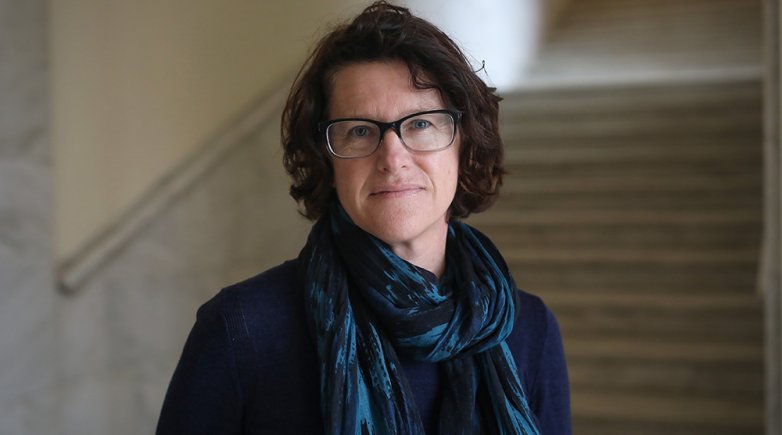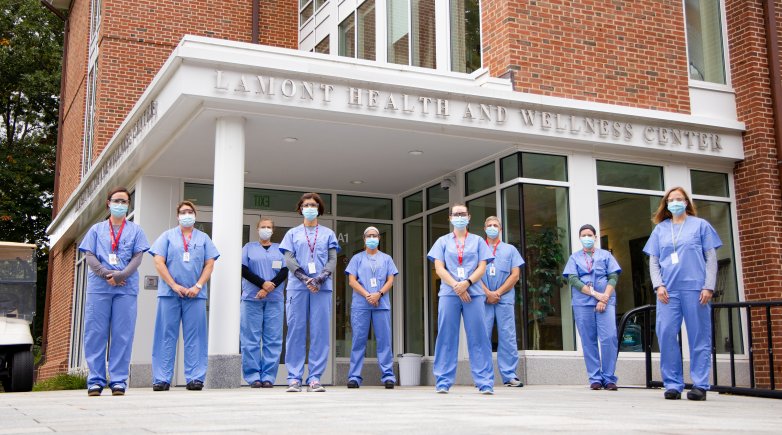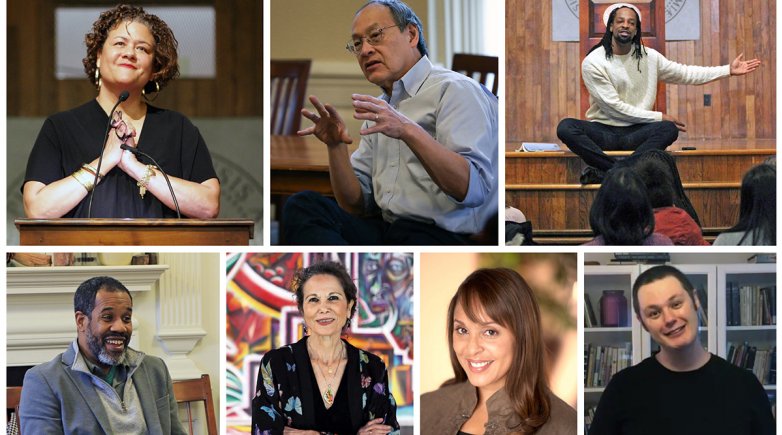Hellos for the heroes
Senior Ryan Pettit’s letter-writing campaign brings joy to veterans.
It was summer 2020, and Ryan Pettit ’21 was on the phone at his parents’ home in rural Papillion, Nebraska, answering questions about corn. His interrogator on the other end was an elderly friend, confined by COVID-19 restrictions to his room at a nearby veterans home in Norfolk. The friend wanted to know, how was the year’s crop looking? (Healthy.) How tall, on average, were the plants? (Six feet.) This being Nebraska, the nation’s number three state in corn production, the topic was of perennial interest during the pair’s weekly phone calls. “You take it for granted, seeing the corn grow outside your window,” Pettit says. “But you can’t really see it from his home.”
Curiosity satisfied, the veteran (whom Pettit declines to name, citing privacy concerns) turned to another favorite topic. “What he really likes,” Pettit says, “[are] puzzles. He talks to me every time about puzzles. He’s even built a 3D one!”
Despite chatting for months, the two have never met in person. Their telephonic friendship began in the spring, when Pettit — marooned at home for the foreseeable future and itching both to ease his own isolation and to mitigate the loneliness of others — decided to reach out to elderly veterans. The son of a veteran himself, he wanted to express his gratitude to those who’d served. And he’d seen the COVID-19 lockdown’s toll on his own grandparents, confined to their rooms in a Florida nursing home. “The isolation was terrible,” he says. “They almost just wanted to give up and leave the home and risk the pandemic. To be stuck in your room like that ... it’s just miserable.”
Pettit contacted Nebraska’s three veterans homes to ask whether residents would enjoy weekly phone calls. Deb Becker, volunteer coordinator at the Norfolk Veterans’ Home, responded quickly, and was surprised to learn that Pettit was acting independently. “When we first spoke with him, we thought it was a school project,” she says. “But he said no, he just wanted to do it because the veterans were alone and couldn’t be with their families.”
Pettit helped Becker establish a Skype connection, then created a system: At a prearranged time, he would dial the facility, where a resident would be waiting. After chatting, the resident would trade places with another interested party. Amid the swirl of conversationalists, his friend emerged as a steady, weekly presence. “This gentleman has some PTSD,” Becker says, “and he needs that one-on-one contact.”
Grass roots
This impulse to foster personal connections comes naturally to Pettit, who grew up in a family rooted in community and steeped in a culture of non sibi. His father, a civilian strategist in the U.S. Strategic Command, served for 28 years as a Navy pilot and captain, and was deployed to Iraq when Ryan was in kindergarten. It was community, Ryan says, that buoyed the family during and after that time — the military community, whose members understood the toll of parental absence, and the Pettits’ rural Nebraska neighbors, who became what he calls an “extended family,” delivering cookies and helping to fix the family’s leaky plumbing. He’d never forgotten their kindness, and made it his mission to treat others similarly.
He brought this spirit of reciprocity and empathy to Exeter, where he co-founded a nonpartisan student political journal devoted to “respectful discourse,” and where he co-led ESSO youth basketball games and served as a Wentworth dorm proctor. Pettit takes proctoring seriously and has continued his duties remotely, for which his adviser, Sean Campbell, is grateful. “I think the role of proctor has a huge component of selflessness,” says Campbell, an instructor in computer science. “A lot of personal time is devoted to making sure students are welcomed and feeling connected to others, [which is] especially important for remote students.” During the pandemic, Campbell asked Pettit to organize online activities for the other dorm students and was delighted with the care Pettit took. “He did a great job putting this together,” Campbell says, “and those in attendance had a blast.”
While tending remotely to young and old, Pettit has also been nurturing some smaller, nonhuman charges: A lifelong gardener, he spent spring break last March sowing a 300-plant nursery in his family’s sunroom, complete with a homegrown vermiculture composting system.
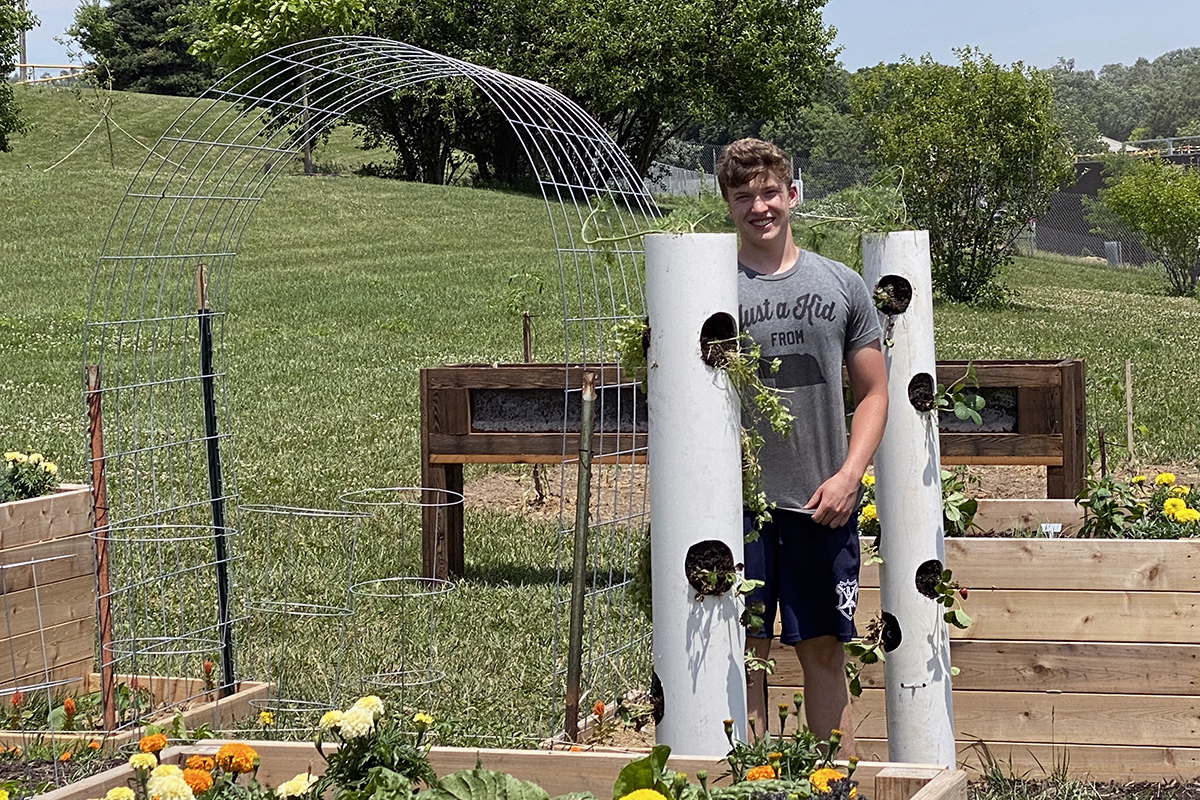
Early last summer, he learned that a center serving low-income children and families wanted to build a community garden in downtown Omaha. “I said, ‘I can do this for free!’” he laughs. He brought 40 or 50 plants over from his own garden and planted them at the community center. With typical forethought, he built raised boxes with plexiglass windows so “kids could see the carrots growing in the box, and the potato tubers growing underneath the soil.
“I really enjoyed nature growing up,” he explains. “I thought it’d be nice for kids from places in the city where they maybe weren’t exposed to that to be able to garden.” The Omaha–Council Bluffs, Iowa, area has a high concentration of “food deserts,” according to the Omaha Community Foundation, meaning many families struggle to find affordable produce. As Pettit’s home garden grew to bursting — it seems 40 tomato plants can yield thousands of tomatoes — he began ferrying over his own peppers, cucumbers, tomatoes and herbs, delighted to share with needy families the vegetables of his labors.
Silver lining
While he was fostering growth and greenery, however, life in veterans homes was contracting and darkening daily. COVID-19 restrictions had halted outings and interactions with the outside world for residents. Indoors, strict room-capacity limits meant no more games or bingo nights. At most, two residents were allowed at a table. Social life was nonexistent. Already at particular risk for loneliness and social isolation — both associated with higher rates of depression, anxiety, suicide, stroke and heart disease, according to the Centers for Disease Control and Prevention — the elderly were reeling.
The ongoing misery made the moments of joy even more poignant. One of Pettit’s happiest days came when a Norfolk nurse told him that staff had never been able to persuade his veteran friend to attend physical therapy. Now, after each call, the resident headed to PT without complaint. “You’re making a large difference in his life,” she told Pettit.
“I didn’t really imagine this to be that impactful,” he admits. “I thought it was just kind of a nice thing to do, to brighten the vets’ days a little, but as soon as I heard that, I thought, ‘I’ve got to try to do something more.’”
He wanted to expand his phone initiative, but while his relationship with Norfolk was strong, his connection to other veterans homes was, quite literally, faltering. At some, poor bandwidth made for glitchy and unreliable communication; others had limited technology, meaning there might be only one device among residents. Some residents didn’t want to interact with newfangled Skype or Zoom, or with phones at all. Pettit tried to enlist local friends as callers, but wrangling a posse of teenage volunteers into some semblance of consistency during a pandemic proved difficult, and too often, callers would renege, leaving veterans waiting in vain. “It was extremely frustrating,” Pettit says.
Salutations
Last summer, he decided to eschew electronics entirely and embrace an older technology: pen and paper. He began cold-calling veterans homes across the country asking whether residents would enjoy receiving citizens’ letters. Ultimately, 29 veterans homes from 23 states signed on. To amplify his efforts, Pettit created a website, Hellos for Heroes, explaining the initiative and urging visitors to write. The mission was simple: “to brighten the days of the many retired veterans stuck in isolation at residency homes.”
Other than encouraging gratitude, he avoided posting editorial guidelines. The point was simply for writers to chat in their own voice, leaving recipients a bit cheerier than before. The site features a sample letter from “Shannon” — a trans-planted Georgian, new owner of a rambunctious puppy, peanut-brittle connoisseur — who turns out to be Pettit’s mom. Pettit refuses to post the family surname, because, he says, “It feels cheesy to me when people stamp their name all over volunteer work.”
“Ryan has never been one to boast about his work or his achievements,” Campbell, his adviser, says. “That just seems to be his personality.”
Once the website launched, Pettit spread the word via Facebook, friends, relatives and media outlets. The publicity blitz worked. “My website traffic has gone way up,” he says. “About 1,000 people or so have interacted with the site, so I imagine if half those people are actually sending letters, that’s 500. I’m happy with that!” Local media has come calling. Daughters of the American Revolution awarded him its Outstanding National Community Service Award for 2020, and 110 DAR chapter members pledged to write letters in December. “Probably the time vets need letters the most,” Pettit says, who spends up to two hours weekly writing letters.
Becker is delighted with the initiative. “We’ve gotten a lot of letters and cards, a lot of calls from people who heard about it on the news,” she says. Most missives arrive from Nebraska, but some hail from as far as Washington, D.C. Her staff pass around the letters and make sure to read them aloud for residents incapable of reading on their own. Other veterans homes post letters to a community board, or save them for residents having a particularly difficult day.
Pettit’s one disappointment: “I don’t really receive letters back,” he says. Veterans homes are cognizant of HIPAA rules and wary of scams, so letters are monitored and residents generally discouraged from responding. Pettit’s letters haven’t reached any PEA alumni that he knows of, but the more writers, the better the chance. Even though he doesn’t receive responses, he knows that Hellos for Heroes missives are appreciated.
“A lot of [Norfolk’s veterans] think Ryan is older than he is because he’s so polite and respectful,” Becker says. “He asks questions: ‘What’s your favorite ball team? What do you like to eat?’ It’s helped them pass the time. And the families really appreciate it, too.”
Lately, residents have been assiduously following Pettit’s college-application process, hoping for happy results. “The guys are so anxious to see how far Ryan goes in life,” she says. “He has really stuck with [us]. He’s just the sweetest young man.”
So what’s next for this empathetic entrepreneur? In college, he hopes to dual-major in biology and economics. At Exeter, his biology classes so inspired him, he launched his own research project studying human metabolic processes; and well before COVID-19, he’d found the world of pharmaceutical development and biotechnological innovation intriguing.
For now, he continues his senior year remotely, writes letters, and, of course, tends to his plants. He calls his grandparents, who are surviving isolation, and speaks to his veteran friend weekly. He accepts all media opportunities to publicize Hellos for Heroes, because ideally, he’d like to see every veterans home in the country deluged with letters from grateful citizens.
Pettit would love to launch a letter-writing program for all retirement facilities, but with an estimated 15,600 nursing homes in the U.S., it’s a steep goal. That said, he’s shown himself to be a gifted and creative problem-solver. “He is doing great things despite the fact that they may be less visible,” Campbell says. “He’s a great kid and a phenomenal scholar.” Don’t put it past him.
Editor's note: This article first appeared in the winter 2021 issue of The Exeter Bulletin.
